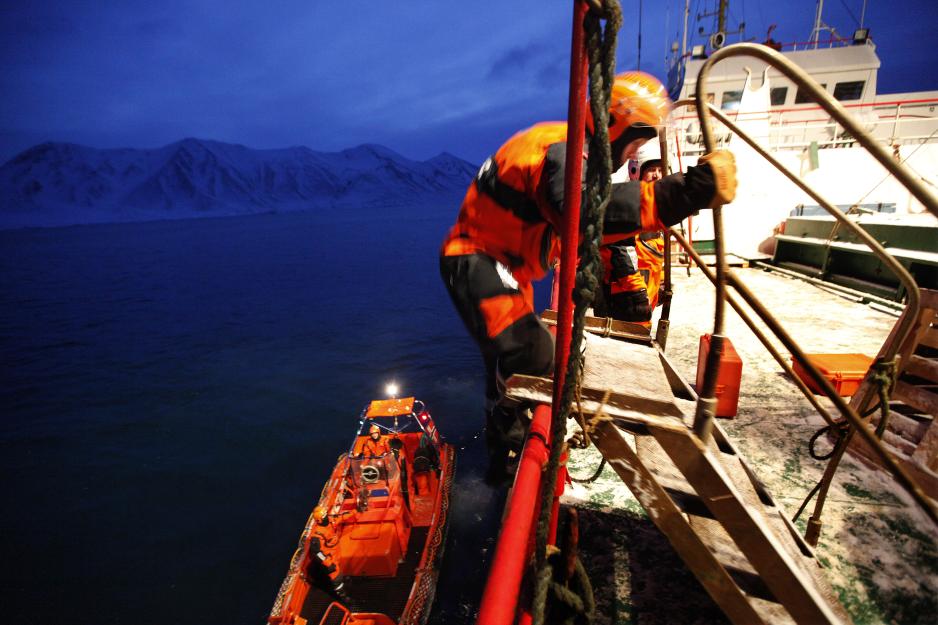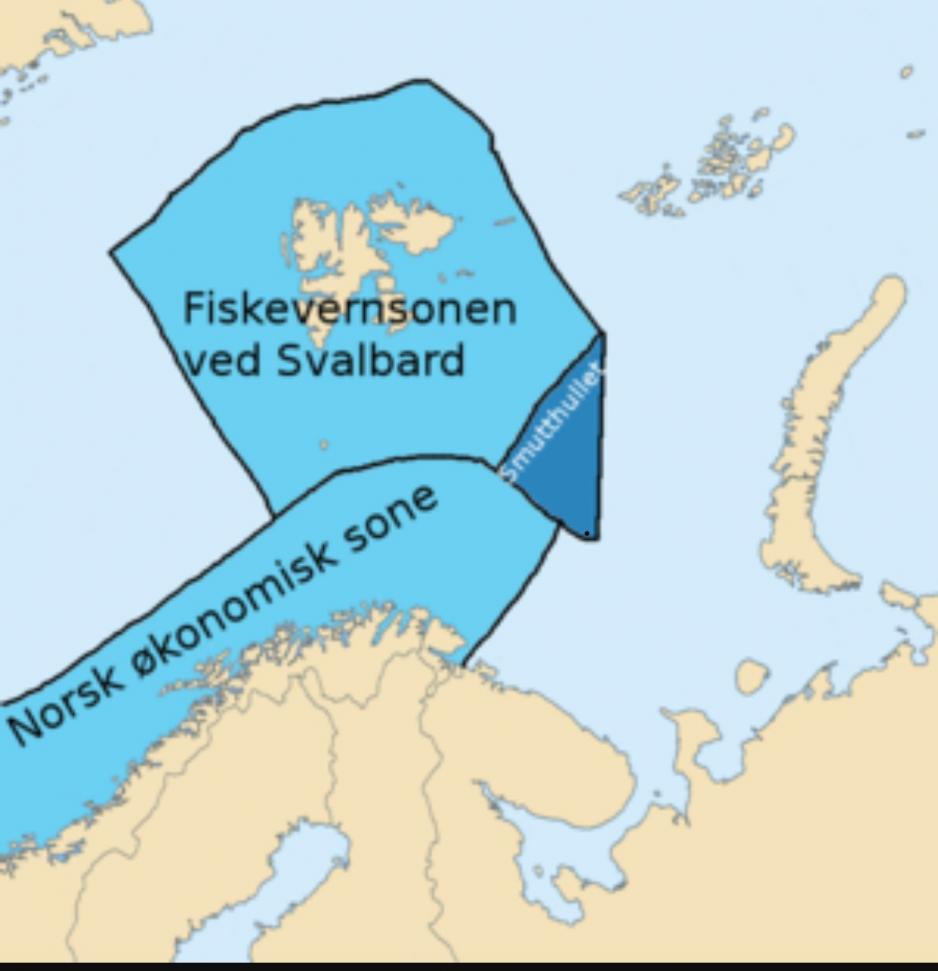Sanctions Against Russian Vessels May Become Burden for Fisheries Cooperation, Says Researcher

Crew from the Norwegian Coast Guard vessel KV Svalbard conducting an inspection onboard a Russian fishing vessel off the coast of Svalbard. (Photo: Torbjørn Kjosvold, Norwegian Armed Forces)
“This is an area in which we should really consider twice and not blindly follow the EU’s sanctions. They neither cooperate with Russia about fisheries in the Barents Sea nor have the fisheries protection zone around Svalbard to consider”, says Senior Researcher Andreas Østhagen at FNI.
The political debate should be more clear about the consequences of a potential ban against Russian vessels in Norwegian ports, argues Senior Researcher Andreas Østhagen at the Fridtjof Nansen Institute (FNI).
“We need to talk about what resource management - and security policy challenges this may have in the longer run. We are moving into an area in which we should really think twice and not just blindly follow the EU’s sanctions. They neither cooperate with Russia about fisheries in the Barents Sea nor have the fisheries protection zone around Svalbard to consider”, he says.
The Liberals want to close ports
Just like the EU does, Norway also considers sanctions that will prevent Russian vessels from docking at Norwegian ports. Great Britain has a.o. already introduced such a ban.
In the political field in Norway, representatives from the Liberals are clear that they want a ban against Russian vessels in Norwegian ports. The Red Party emphasizes that Norway must have its own punitive measures aimed at those responsible for the war, namely Putin and his circle of oligarchs, but that separate assessments must be made around the Russian fishing fleet:
"We think it is too passive to wait for the EU. Red wants to be stricter against the oligarchs. But if we are to automatically copy the EU's sanctions policy, the fishing fleet is a reason why we must make our own assessments and have a differentiated policy, says Marie Sneve Martinussen (R) to E24.
In a political radio program at Norwegian broadcaster NRK, MP Ola Elvestuen (Liberals) recently said that Norway should strengthen sanctions against Russia.
“We should support Ukraine with weapons and equipment; however, we should also bolster sanctions as much as we can. The next step would be closing Norwegian ports for Russian vessels and Russian-owned vesels. Great Britain and Canada have done so already. It is high time we do too. Ukrainian port cities are victims of massive firing, and we cannot have Russian oligarchs sending their vessels to Norwegian ports.”
The government will await the EU’s decisions.
Norwegian Fisheries and Seafood Minister Bjørnar Skjæran said on the same radio program that the Ministry “is working hard with the issue of closing ports”. He points out that both the Law of the Seas (UNCLOS) as well as international agreements lay down regulations for what can be done. When asked why the government so far largely has protected the fish industry from the sanctions, he responds:
“We have a certain geography, and we know it. We share the Barents Sea with Russia. There is no way we can manage the rich fish stocks without the other country taking part in this management. Protecting this cooperation is important for Norway."
Such a sanction could become a burden for the fisheries cooperation
Little processing in Norway
On the one hand, there are the economic consequences that would stem from such a decision. The restrictions will a.o. hit Norwegian maritime industries, which offer supply services when the vessels dock in Norwegian ports. Such a decision would, however, not be perceived as critical by the fishing industry, says CEO Svein Ove Haugland in Norges Råfisklag, an interest organization. In 2021, the turnover from Russian raw materials in Norway reached some NOK 1.3 billion. That is less than ten percent of the total turnover of the industry, which reached about NOK 13.5 billion, he explains.
“Most of the raw materials the Russians land here is re-exported from Norway without its being processed here. We would argue that a halt to these landings will not mean much in and of itself. It is only marginal compared to what happens in Ukraine”, Haugland points out.
Long-term challenges
Nevertheless, the dimensions related to the established fisheries cooperation with Russia as well as the long-term security policy challenges have been under-communicated, Østhagen of FNI argues. If the Liberals were to have their way, this could have consequences we cannot predict, he argues.
“If Norwegian authorities were to deny Russian vessels access to Norwegian ports, that does not mean that fisheries cooperation with Russia were to come to a halt immediately. The point is that it can lead to a series of repercussions which over time can jeopardize the cooperation about fish stock management.”
In the 1990s, the cod stocks in the Barents Sea were near collapse due to uncontrolled fisheries. Norway and Russia then formed a joint fisheries commission through which annual meetings in the fall were organized to decided quotas and regulations for the fisheries. Later, in the 2000s, the fish stock started growing again. Today, it is one of the world’s largest cod stocks.
“I cannot imagine Russian authorities negotiating with Norway about an overall quota for the Barents Sea while Norway simultaneously bans Russian vessels from Norwegian ports. Even though it should be possible to agree on an overall quota through other mechanisms, it would nevertheless be a burden for the fisheries cooperation.”

Illustration: Wikimedia Commons / Kjetil Ree, based on NormanEinstein and historicair.
The Svalbard fish protection zone
In addition to questions about the fisheries management, Østhagen argues that there is an additional security policy dimension to the proposed measure. He explains that the ban may cause conditions under which handling a potential disagreement in the fisheries protection zone around Svalbard could be more difficult.
“The sea areas around Svalbard are something we have agreed to disagree about for a long time. However, while Russia does not recognize the Svalbard waters as Norwegian but rather as international waters, this has no practical consequences. Our cooperation with Russia has opened up for fisheries in this area as long as one relates to the overall quota and other regulations.”
Yet there have been conflict situations in the zone. Østhagen mentions a series of examples involving the Norwegian coast guard and Russian vessels in which vessels have been inspected and arrested by the Norwegian Coast Guard, however, they have rejected Norwegian authorities as they do not recognize Norway’s right to asserting authority around Svalbard.
Trustful relationship
“Through the fisheries negotiations, one has agreed on regulations and quotas, and local cooperation has removed much of this tension and the need to arrest and to tow the vessel to a Norwegian port. There are still inspections, yet there is a scheme in place through which this is solved at sea using fines. The Coast Guard itself points to this scheme as vital for these events to not escalate. Yet the scheme also requires an element of trust between the parties”, he emphasizes.
Even though a potential ban to keep Russian vessels from docking at Norwegian ports may not necessarily lead to immediate consequences, Østhagen stresses that Norway should consider a potential sanction in relation to the overall security policy situation.
“Conflict situations may emerge, not necessarily because Russian authorities want it, but because fishers and shipowners may resist the Norwegian approach in the Svalbard zone. If the Russian state were to interfere, it could become a bigger crisis for Norway given the current situation”, he says in closing.
In an earlier version of the article, HNN wrote that the Red Party wanted to close Norwegian ports to all Russian ships. This is incorrect, Red wants sanctions against Putin and his circle, not Russian fishing boats. The article is now updated. Red.
This article was originally published in Norwegian and has been translated by HNN's Elisabeth Bergquist.


